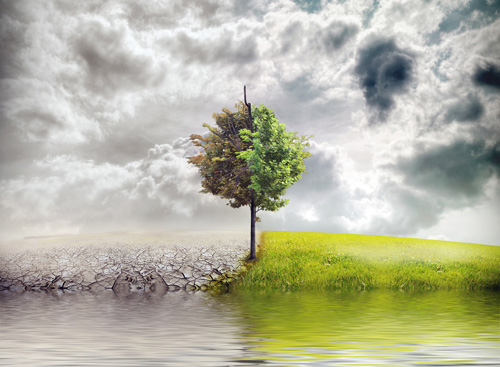
Despite the naysayers, there is more and more research every day that clearly states that climate change is happening, and at a rate that is affecting not just our environment but also our weather and animals’ ability to adapt to these fast changes. As more information becomes available, environmentalists are working to take steps to make improvements.
In September 2013, the United Nations issued a report that said that the earth’s climate has changed in “unprecedented ways” since 1950 and that they are 95% certain that humans are to blame. This news is quite disturbing, but one aspect of it was particularly puzzling to many environmentalists. Although temperatures rose significantly in the 1970s, the past ten or fifteen years haven’t seen the type of increase predicted – in fact there has been a reduction. Researchers had no explanation, other than the fact that due to considerable variables, weather patterns are best measured in sets of 50 years rather than smaller amounts of time. They added that the base year, 1998, was a particularly warm year.
Other theories include volcanic eruptions, the deeper ocean water absorbing some of the warmer temperatures, or increases in high-altitude water vapor. However, perhaps this decrease in warming trends could be due to the fact that the world has become more aware of the global warming and has been taking steps to stop climate change. Berkeley physics professor, Richard A. Muller, wrote an op-ed piece stating the fifteen year lull is consistent with historic variability and that it’s more likely comparable to a landing on a flight of stairs – you may pause to catch your breath part way there, but you’re not to the top yet.
While some people argue that global warming isn’t that big of a concern and point to the fact that animals can adapt to survive, other recent studies have found that climate change is happening at a rate faster than animals are able to adapt. Professor John Weins, of the University of Arizona, conducted a study of reptiles, mammals, amphibians and birds and found although they certainly can and do adapt, their rate of change is very slow and takes many generations to effectively change, and the rate of climate change is much faster than many animals could possibly adapt. The study also pointed out that for some animals, there’s nowhere else for them to go. While other species have lived in times of great change and have had millions of years to adapt to it, these climate changes are taking place in only a few generations, which would require animals to evolve at 10,000 times their current pace. They will face extinction if something isn’t done to prevent it.
Fortunately, there are plans in the works that will help. President Obama announced a new climate change plan in July – it would be the first limits on carbon pollution from power plants and cuts greenhouse gases, strives toward making buildings more energy efficient and encouraging renewable energy projects. Recently, the senate confirmed Gina McCarthy to head the Environmental Protection Agency. With McCarthy leading the EPA and climate-focused senator Ed Markey joining congress, environmentalists are excited about the possibilities of fighting climate change and global warming through continued support of landmark legislation.
Although increasing warnings about climate change and global warning are cause for concern, there are lots of researchers, lawmakers and environmentalists who are hard at work investigating the best ways for us to prevent further damage and perhaps even reverse the effects of the past fifty years. Admitting to a problem is the first step toward recovery.

